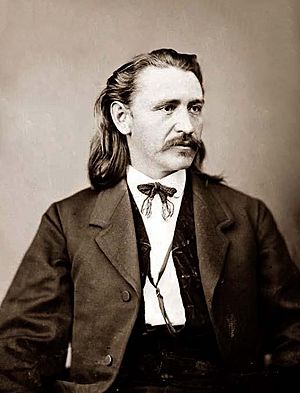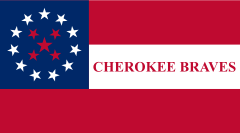Elias Cornelius Boudinot facts for kids
Quick facts for kids
Elias C. Boudinot
|
|
|---|---|

Boudinot, c. 1860
|
|
| Delegate to the C.S. House of Representatives from the Cherokee Nation's at-large district |
|
| In office February 18, 1862 – May 10, 1865 |
|
| Preceded by | Constituency established |
| Succeeded by | Constituency abolished |
| Personal details | |
| Born | August 1, 1835 New Echota, Cherokee Nation (present-day Gordon County, Georgia), U.S. |
| Died | September 27, 1890 (aged 55) Fort Smith, Arkansas, U.S. |
| Resting place | Oak Cemetery, Fort Smith, Arkansas, U.S. 35°22′10.3″N 94°24′06.8″W / 35.369528°N 94.401889°W |
| Political party | Democratic |
| Spouse |
Clara C. Boudinot
(m. 1885) |
| Parents | Elias Boudinot (father) Harriet Boudinot (mother) |
| Relatives | Stand Watie (uncle) |
| Education | Burr Seminary |
| Military service | |
| Allegiance | |
| Service | |
| Years of service | 1861–1862 |
| Rank | |
| Unit | 1st Cherokee Mounted Rifles |
| Battles | American Civil War |
Elias Cornelius Boudinot (August 1, 1835 – September 27, 1890) was an important American politician, lawyer, and newspaper editor. He was a delegate for the Cherokee Nation in the Congress of the Confederate States during the American Civil War. Before that, he served as an officer in the Confederate States Army.
Elias C. Boudinot made history as the first Native American lawyer allowed to argue cases before the U.S. Supreme Court. He was the son of Elias Boudinot, a well-known Cherokee leader, and Harriet Ruggles Gold Boudinot. His father was the editor of the Cherokee Phoenix, the first newspaper published by a Native American nation.
Sadly, his father died in 1839 due to disagreements over land treaties. His mother had passed away earlier in 1836. Elias and his siblings were sent to live with their mother's family in Connecticut for their safety and education. After the Civil War, Boudinot helped negotiate new agreements between the Southern Cherokee and the United States. He also worked to bring railroads to the Indian Territory and supported the idea of Native Americans becoming U.S. citizens.
Contents
Early Life and Education
Elias Cornelius Boudinot was born on August 1, 1835, in New Echota, which was then part of the Cherokee Nation (now Gordon County, Georgia). His father, Elias Boudinot, was a respected Cherokee leader. His mother, Harriet Ruggles Gold Boudinot, was from a notable family in Connecticut. They met when his father was a student there.
Elias's father was famous for editing the Cherokee Phoenix newspaper from 1828 to 1832. This newspaper was special because it was the first one created by a Native American nation. It printed articles in both English and Cherokee, using the syllabary (a writing system) invented by Sequoyah. The newspaper was read all over the United States and even internationally.
Elias Cornelius Boudinot was named after a missionary named Elias Cornelius. He was the fifth of six children. When Elias was born, his father and other Cherokee leaders signed the Treaty of New Echota. This treaty gave up the remaining Cherokee lands in the Southeast in exchange for new lands west of the Mississippi River.
His mother, Harriet, passed away in 1836. In 1839, when Elias was just four years old, his father and other leaders who signed the treaty were killed by other Cherokees who disagreed with the treaty. Elias's uncle, Stand Watie, survived a similar attack on the same day. To keep them safe, Elias and his brothers and sisters were sent back to Connecticut to live with their mother's family. They made sure the children received a good education. As a young man, Elias studied engineering in Manchester, Vermont.
Starting His Career
In 1851, when he was eighteen, Boudinot moved back West and taught school for a short time. By 1853, he settled in Fayetteville, Arkansas, close to the Cherokee people. He reconnected with his uncle, Stand Watie. Elias studied law and became a lawyer in Arkansas in 1856.
One of his first big successes as a lawyer was defending his uncle, Stand Watie. Watie had been accused of killing James Foreman, who was involved in the attack that killed Elias's father and other family members in 1839. Elias wanted to help his family regain their important standing among the Cherokee.
In Arkansas, Boudinot became active in the Democratic Party. He supported the idea of slavery, which was a common view in the party at that time. In 1859, he was elected to the city council of Fayetteville. That same year, he started a newspaper called The Arkansan with James Pettigrew. This newspaper also supported slavery and wanted to see railroads built into the Indian Territory. Many Native Americans did not want their lands divided by railroads. Boudinot believed the territory should become a regular part of the United States and later supported making Oklahoma a state.
Role in the American Civil War

In 1860, Boudinot became the chairman of the Arkansas Democratic State Central Committee. He watched as tensions grew across the country. In 1861, he served as the secretary for the meeting where Arkansas decided to leave the Union.
He also joined the 1st Cherokee Mounted Rifles and served under his uncle, Stand Watie. Boudinot was elected a major in this regiment. In 1862, he was chosen to be a delegate to the Confederate States House of Representatives. He represented the group of Cherokee people who supported the Confederacy during the war. (A smaller group of Cherokee supported the Union.)
After the war ended, Boudinot was the chairman of the Southern Cherokee Delegation. They had to negotiate new treaties with the United States. The Cherokee were forced to give up some land, free their enslaved people, and offer full citizenship to formerly enslaved people who chose to stay with the nation. This was similar to what the United States required of the Southern states that had rebelled.
Later Years and Contributions
After the Civil War, Boudinot and his uncle, Stand Watie, opened a tobacco factory. They hoped to avoid taxes based on a treaty the Cherokee had signed in 1866 with the United States. However, U.S. officials disagreed and seized the factory for not paying taxes. In 1871, the U.S. Supreme Court ruled against Boudinot and Watie. The court said that Congress could change previous treaty agreements and that the 1866 treaty did not renew tax exemptions.
Boudinot remained active in politics and society in the Indian Territory after the war. He helped bring railroad construction to the area. He also supported new government policies that allowed communal tribal lands to be divided and given to individual tribal members. Any land left over was then sold to non-Native Americans. Boudinot even founded the city of Vinita, Oklahoma.
He spent time in Washington, D.C., working to influence the federal government. He often lobbied for railroads. In 1873, Congress passed a bill to help Boudinot financially, but President Ulysses S. Grant did not sign it into law. From 1874, Boudinot worked as a private secretary for Congressman Thomas M. Gunter from Arkansas. He also held some paid committee clerk positions. After Gunter left Congress, Boudinot became the secretary for U.S. Senator James David Walker of Arkansas. In 1885, he tried to become the Commissioner of Indian Affairs but was not successful.
He also practiced law in Arkansas with politician Robert Ward Johnson. Boudinot was very involved in issues related to the Indian Territory. He often gave speeches about Cherokee issues and the development of the West. He was known as a great speaker. Boudinot played a part in the eventual creation of the state of Oklahoma in the early 1900s. Many Cherokee and other tribes first tried to create a state controlled by Native Americans. He continued his work as a lawyer until he died. He passed away at age 55 from dysentery in Fort Smith on September 27, 1890. He is buried in Oak Cemetery.
Personal Life
Elias Cornelius Boudinot did not marry until 1885, when he was 50 years old. He married Clara Minear, and they did not have any children. After their marriage, they moved to Fort Smith, Arkansas, where they lived for the rest of their lives.
Images for kids
 | Kyle Baker |
 | Joseph Yoakum |
 | Laura Wheeler Waring |
 | Henry Ossawa Tanner |




